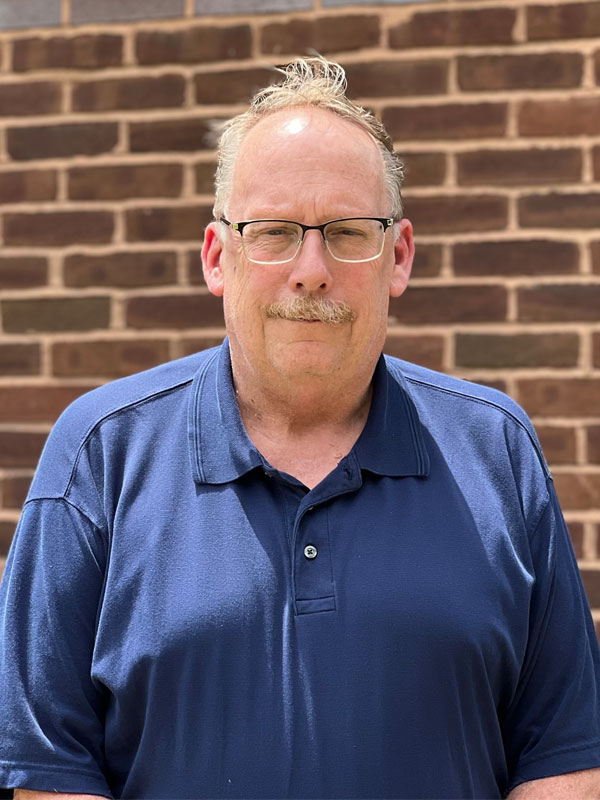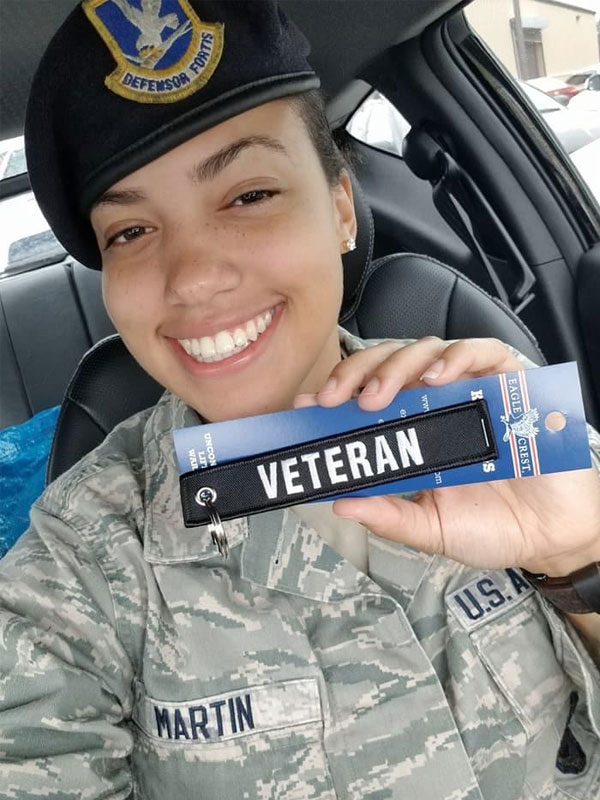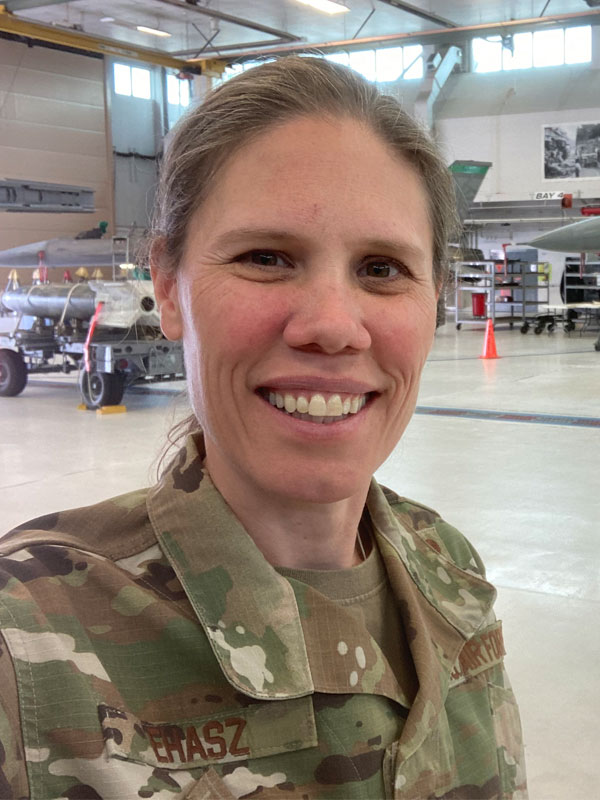From skills in areas like leadership and teamwork to more technical prowess, military veterans bring a valuable array of capabilities to the workforce—and hiring and enrollment managers at Case Western Reserve University are keenly aware.
In honor of today (July 25) being National Hire A Veteran Day—a time to raise awareness of civilian employment for veterans and inspire employers to recruit and hire them—we’re putting the spotlight on three service members who have brought their unique expertise to the university.
Read on to see how these veterans are making an impact in areas such as facilities management, public safety programming and doctoral studies.
Claude “Bud” Morris

Assistant Director of Space and Facilities Planning, School of Medicine
At Case Western Reserve University School of Medicine, Claude “Bud” Morris can be found ensuring everything from laboratory controls to fume hoods are in working order. While he credits the university’s friendly culture as his favorite part of the job, the work he manages affords the Lakewood native another fulfilling experience—the chance to flex many of the skills he developed during his time in the Armed Forces.
Morris enlisted in the U.S. Navy as a cost-effective alternative to college and rose to hold the rank of Sonar Technician first class (E-6). After being stationed in Mayport, Florida, he deployed numerous times to the Middle East, serving as a core member of an intel gathering platform.
“We took part in solving the Iran Hostage Crisis on the first deployment and escorting Yassir Arafat out of Lebanon,” Morris explained. “We were involved in the turnover of the Panama Canal to ensure a safe and secure transition from a military standpoint.”
These deployments helped Morris hone his ability to stay calm under pressure—a skill his supervisor at Case Western Reserve, Jill Stanley, points to as one of the strongest assets Morris has displayed since he started at CWRU in 2015.
“Bud’s calm demeanor is reassuring to our faculty, staff, and students when problems arise,” she explained. “He is very collaborative and always willing to help our team and the school in any way possible.”
For Morris, he credits his military background most of all for the work ethic it instilled in him.
“Military veterans are taught to work as a team, to cut no corners, and to have each other’s backs at all times,” he said. “In the Navy, this teamwork ensures the safety of the crew and of the ship. I see this brought into the civilian world as an asset to whatever endeavor they are hired into.”
Chiane Martin

Programs and Initiatives Manager, Department of Public Safety
As a high school student in nearby Garfield Heights, Chiane Martin was eager to dive into a fulfilling career—but wasn’t quite sure how. It was a U.S. Air Force recruiter who helped her find her path.
What began as a spontaneous conversation led Martin to a six-year journey as a military police officer, where she ranked as an E-5 Staff Sergeant. From her first deployment in Kaiserslautern, Germany, to later deployments in East Africa and then stateside at Joint Base Andrews in Maryland, Martin applied a learning mindset to whatever she encountered. Her experiences partnering with German police on the French border, working with Army infantry and tankers, and even closely supporting Air Force One all taught her important lessons—among them, the need to stay on her toes.
“The military taught me to adapt and overcome, which is something I not only use in my work life but my personal life,” Martin said. “Life throws so many things at us when we least expect them … We can be sad and let them eat away at us, or we can learn to work through them and create a new path, all while remembering one size does not fit all and that’s okay as long as you don’t let it take you out of the game.”
This mindset serves Martin well in her role as the programs and initiatives manager in CWRU’s Division of Public Safety, a role she assumed in 2022. Here, she is responsible for creating and managing the division’s Outreach, Assessment, Resources and Response (OARR) Co-Responder Team, an initiative that will ensure a clinician and an officer always ride along on responses to mental health-related calls on campus.
“Chiane’s adaptability and creative mindset made her an ideal candidate for her role,” said Martin’s supervisor Megan Koeth, executive director of public safety. “Like many of the other service members we’re lucky to have on staff, Chiane brings a valuable perspective to her work that helps us make an even greater impact on public safety.”
And for Martin, the team aspect of her work at CWRU is incredibly rewarding, too.
“Working in the Division of Public Safety, this is the first time I’ve experienced some of the camaraderie and belonging that I experienced in the military,” she said.
Sharon Ehasz

PhD in Organizational Behavior student, Weatherhead School of Management
Growing up in Lomita, California, Sharon Ehasz had a lot to look up to—both figuratively and literally. Her family’s extensive military background lent her many role models for applying the desire she felt to serve something greater than herself. But it was her passion for flying—a skill she first took up as a young teenager—that set her sights on the U.S. Air Force, one of the only military branches in which her family had yet to serve.
Ehasz launched her military career as a cadet in the U.S. Air Force Academy before graduating with honors, serving on active duty stationed in Alaska, joining the U.S. Air Force Reserves and then transferring to the Air National Guard. She rose to the rank of Lieutenant Colonel in the Air Force, and now is a drill status guardsman in the Ohio Air National Guard working at the Joint Forces Headquarters.
On top of all she’s accomplished to date, Ehasz has turned her focus toward a new way to serve: investing in others by way of academia. Specifically, she’s pursuing a lifelong dream of becoming a professor.
Ehasz and her husband moved their family to Cleveland in the fall of 2020 so that she could enroll in Weatherhead School of Management’s PhD in Organizational Behavior program. Now a fourth-year student and hopeful PhD candidate, Ehasz is well on her way toward turning her dreams into a reality—and the faculty members in her program credit her military background for much of her success.
“As a Lt. Colonel, Sharon learned and refined her emotional intelligence in a pragmatic culture with a tremendous dedication to her country, diversity, and learning,” said her advisor, Distinguished University Professor Richard Boyatzis. “In her doctoral program, her leadership with classmates and students looks seamless but was refined over decades. Sharon is a testament to effective military and civilian leadership with an amazing commitment to learning and research with relevance.”
In Ehasz’s view, the core added value veterans bring to the civilian workforce—be it in academia, industry, or beyond—can be summed up in one word: perspective.
“[Veterans] are brought up in a culture/system of diversity that then takes us all over the world to interact with other cultures,” she explained. “In addition, we are trained that you don’t leave your teammate behind. In today’s world of increasing isolation and individualism, that perspective of support, teamwork and dedication to others is priceless!”
